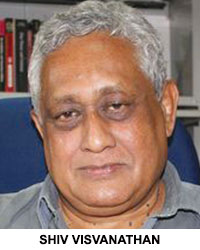
The National Education Policy (NEP) 2020, released on July 29, is being celebrated by many as a great document, the BJP/NDA 2.0 government’s gift to the nation to mark the 74th anniversary of independence. I was looking forward to celebrating it, hoping it would be a continuation of the monumental Radhakrishnan (1948) and Kothari (1967) national education policy reports.
But after reading it, I experienced shock, almost unease. It reminded me of the line of questioning the great citizen scientist and energy expert Amulya Reddy used to adopt with his students. Whenever they answered his questions by way of newspaper headlines, Reddy would insist: “Tell me what’s in the third paragraph”. He was aware that there were gaps in the way most students thought. Reddy was quick to spot the gaps between the philosophy and terminology of an idea. Most students don’t understand the culture of the worlds they inhabit. Secondly, their ritual of operationalisation of ideas tends to be skimpy. They usually institutionalise a process instead of a value framework
This statement was brilliantly illustrated by a Tibetan monk teaching at MIT, Boston, who observed that when notions of efficiency and instrumentality are introduced in education, schools became joyless places and education a dismal science. NEP 2020 is a testimony to this learned monk’s insight
There are two ways of reading the report. One can read it as a shopping list in an education supermarket or read it to understand the philosophy underlying it. When one takes the second option, NEP 2020 is disappointing. Although this makes me a marginal outlier one cannot doff the hat to an exercise of rank illiteracy.
NEP 2020 has several basic flaws that need to be highlighted. First, is the idea of childhood. Childhood is an era of dreams, myths and socialisation through play. It’s a period of freedom and anarchy. But to make childhood relevant, the policy treats childhood education as an industrialist, Taylorist, Fordist system. In fact, if one grasps the metaphor, NEP 2020 envisages childhood education as a rocket fired in stages. There’s little awareness of the dreams of Montessori, Tagore or Geddes in this document because it lacks sense of play, the idea of homo ludens (‘playful man’) that the Dutch scholar Johan Huizinga eulogised. Without playfulness and the smell of it, policy instrumentalises education.
Moreover, there’s an incompleteness in the development of ideas in the NEP 2020 that needs to be highlighted. First, it confuses freedom with choice. Freedom as a philosophy lets one articulate the framework of choice. In NEP 2020, choice is presented as a fixed questionnaire. This is evident in its prescription for universal literacy and numeracy. Educationists tend to stress that the two terms are not complete without ecolacy (environment awareness).
Number and language have to go hand in hand but ecolacy is an absentee concept in the report. As a result, the idea of diversity and plurality is not worked out systemically or systematically. Diversity is the theory of difference. Difference needs syncretism and dialogue and there’s no sense of it in the pedagogies prescribed by the new policy. Moreover diversity is an epistemic category. But in the policy a sense of pedagogy is projected without a sense of epistemology. NEP 2020 could have done with some grounding in the sociology of knowledge. It blackboxes science and technology as immaculate concepts.
Unfortunately, in the new education policy presented to the nation after a gap of 34 years — there’s no convincing explanation except that thousands were consulted — is full of cliches and reiterations of the obvious. It says every child must be located in a culture but there’s no definition of culture. In fact, if one made a checklist of the great intellectual revolutions that followed the industrial and especially the linguistic, information and knowledge revolutions, one senses NEP 2020 is still tackling the industrial revolution. It’s a prescription with a Victorian mindset presented as a futuristic document. It propagates multilinguism and multidisciplinarity but it seems to have no understanding of the philosophy underlying these concepts. It has nothing to say about the depth of orality by legislation or little about translation. As few of the concepts it uses have a sense of embeddedness or heuristic, it has little sense of the philosophy of knowledge. Multidisciplinarity and multilinguism are fashionable terms sprinkled around rather than epistemologies for the future. Moreover, the report discusses pedagogy without any theory of knowledge creation.
Perhaps because it has been restricted to 65 pages, NEP 2020 conveys the sense that the information revolution has happened without the knowledge revolution. The same discreteness of concepts atomizes many of the terms blurring the links between diversity and sustainability, diversity and plurality. I remember my father, a scientist, telling me when concepts are not clear, policy prescriptions become pompous. There’s a pervasive pomposity in the National Education Policy 2020.
Other articles by Shiv Visvanathan: